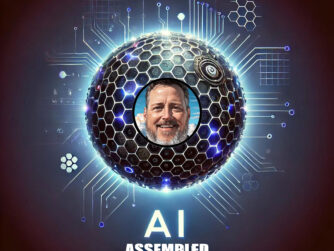
AI Assembled
10/14/24
Season 01, Episode 01
AI Assembled is a cutting-edge podcast where AI takes center stage. Hosted by Chris Doelle, the show features content sourced by ChatGPT and expertly crafted into engaging discussions through NotebookLM. Each episode dives into the latest developments in artificial intelligence, blending human insight with the power of machine-generated storytelling. Tune in to explore how AI is reshaping industries, all with the help of innovative AI tools working behind the scenes.
In today’s AI news, we’ll dive into some of the most exciting developments shaping the future of technology and innovation.
OpenAI has introduced a series of groundbreaking updates that enhance AI’s capabilities for both businesses and developers. One of the standout features is Vision Fine-Tuning, which allows AI models to process and analyze images, opening up new possibilities in areas like medical image analysis. Additionally, there’s the new Realtime API, designed to make voice interactions faster and more responsive by improving speech-to-speech applications. OpenAI also launched Model Distillation, which allows developers to train smaller AI models using the outputs of larger ones. This not only reduces costs but also brings advanced AI within reach for companies with limited resources. To help even more, Prompt Caching was introduced, which stores frequently used prompts for up to an hour, significantly cutting costs for developers who rely on repetitive inputs.
Meanwhile, Adobe continues to push the boundaries of creativity with its Firefly AI models. They’ve rolled out new tools, including Text to Video and Image to Video, allowing creators to generate high-quality video content from simple text prompts. These updates help video creators produce seamless clips with ease, while the Generative Extend feature smooths out video transitions and edits. These advancements are part of Adobe’s mission to make AI-driven content creation faster, more intuitive, and commercially safe for use across industries.
AI research also made headlines this year at the Nobel Prizes. The Nobel Prize in Physics was awarded to John J. Hopfield and Geoffrey Hinton for their groundbreaking work in neural networks, which laid the foundation for modern AI. In chemistry, Demis Hassabis, John Jumper, and David Baker were recognized for their advancements in AI-driven protein folding. This development is transforming biological research and accelerating breakthroughs in drug discovery.
Lastly, AMd is heating up the competition in AI hardware with the launch of its MI325X AI Chip, designed to rival Nvidia’s Blackwell series. This new chip promises to deliver cutting-edge performance for enterprise applications that rely on intensive AI processing, signaling that the race for dominance in AI hardware is far from over.
These stories highlight just how rapidly AI is transforming industries—from medical research to content creation and even hardware performance. Stay tuned as we continue to cover the most impactful innovations in AI.

